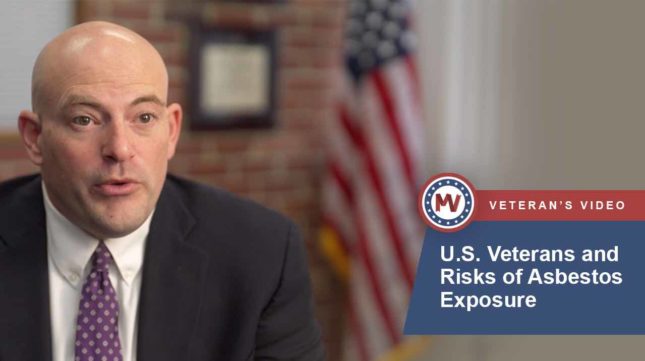Asbestosis is a serious lung condition caused only by asbestos exposure. It develops decades after someone inhales asbestos fibers. The lungs are slowly irritated by these fibers, leading to scarring and difficulty breathing. U.S. veterans are at a higher risk of asbestosis, as the military relied on asbestos-based products for decades. Below, see how veterans can access military benefits, medical care, and compensation for asbestosis.
What Is Asbestosis?
Asbestosis occurs when microscopic asbestos fibers get lodged in the tiny sacs within the lungs (called alveoli). The fibers damage the alveoli and prevent the lungs from properly filling with air.
 Though asbestosis is not cancerous, it is still very dangerous. Over time, asbestosis can lead to fatal outcomes like respiratory failure or heart failure.
Though asbestosis is not cancerous, it is still very dangerous. Over time, asbestosis can lead to fatal outcomes like respiratory failure or heart failure.
Those with asbestosis could also be at risk of mesothelioma, a deadly cancer also caused by asbestos exposure.
Thankfully, U.S. veterans who develop asbestosis could qualify for medical and financial benefits offered by the U.S. Department of Veterans Affairs (VA), as well as compensation.
Get help pursuing compensation for asbestosis now.
Veterans & Asbestosis Risk
U.S. veterans who served between the 1930s and early 1980s may be at a higher risk of asbestosis than the general public. The U.S. military heavily relied on asbestos-based products during this time, so many veterans were exposed to asbestos on a regular basis.
The military and most civilians didn't know the dangers of asbestos for decades. The makers of asbestos-based products knew the truth as far back as the 1930s but hid it to keep profits high.
Fortunately, the VA understands the connection between asbestosis and military asbestos exposure and offers both medical care and compensation to affected U.S. veterans.
Video Summary: In this video, VA-accredited attorney Eric Hall explains why U.S. veterans are at risk of asbestos-related diseases like mesothelioma. He also breaks down how affected veterans can access military benefits and medical treatment. Call (877) 450-8973 to get started. View Transcript
Veterans who served in the military between the 1930s and the 1980s were likely exposed to asbestos while they were on active duty. Usually, if you've developed an asbestos-related disease, you developed that disease because you had an excessive amount of exposure to asbestos.
If a veteran believes they were exposed to asbestos while serving in the military, we encourage them to call the Mesothelioma Veterans Center so that we can work together to help them file for VA benefits.
The VA will recognize any asbestos-related disease as long as your asbestos exposure happened while you were on active duty in the military.
In addition to VA benefits, the Mesothelioma Veterans Center can connect veterans with world-renowned physicians and nurses on staff that can answer any of your treatment questions. We encourage veterans to call and find out how we can help them.
Asbestosis Causes
The only known cause of asbestosis is exposure to asbestos fibers.
Veterans may have been exposed by working on:
- Construction sites
- Ground vehicles
- Planes
- Ships & shipyards
When asbestos dust is inhaled into the lungs, microscopic fibers may get stuck in the alveoli. The human body cannot remove or break down these durable fibers.
Over several decades, healthy lung tissue becomes inflamed due to the asbestos fibers and scar tissue forms. Severe damage from asbestos limits lung function.
Risk Factors for Asbestosis
Anyone who was exposed to asbestos may develop asbestosis later in life. However, those diagnosed with asbestosis usually worked around asbestos for years or decades at a time.
Notable risk factors for asbestosis include:
- Industrial work: Those who served in industrial trades like carpentry or construction work in the 20th century often used asbestos-based products daily for long periods of time.
- Military service: Asbestos-based products could be found throughout U.S. military assets. Veterans who served as shipyard workers, insulators, and boiler tenders had a very high risk of exposure since they had to work with asbestos every day.
- Secondhand exposure: Those who lived with someone who worked around asbestos also had a high risk of exposure. Workers could bring home asbestos fibers on their clothes, and their families could inhale them without notice.
- Smoking: According to the American Lung Association (ALA), those who smoke have a higher risk of developing asbestosis. Smoking weakens the lungs and makes it easier for asbestos fibers to cause irritation.
Connie, a World War II veteran who fought in the Battle of Iwo Jima, was diagnosed with asbestosis decades after he served. He was exposed to asbestos for 30 years while serving as an electrician. Since asbestos is heat and flame-resistant, it was used in military electrical wiring for decades.
Pursue financial compensation for asbestosis or other asbestos-related diseases now if eligible.
Symptoms of Asbestosis
Common asbestosis symptoms typically affect the lungs and chest.
According to the Centers for Disease Control and Prevention (CDC), oxygen and carbon dioxide cannot properly flow through lungs damaged by asbestosis. As a result, those with asbestosis have a harder time breathing.
Other notable symptoms of asbestosis include:
- Chronic cough
- Chest pain and tightness
- Crackling in the chest while breathing
- Loss of appetite
- Shortness of breath
- Weight loss
Those with asbestosis may also develop other symptoms in some cases. For example, their fingertips may bulge into a boxy shape (known as clubbing). Scientists still don’t know exactly why asbestosis leads to this symptom.
Asbestosis Diagnosis
To diagnose asbestosis, doctors will take note of your symptoms and ask if you were ever exposed to asbestos. 

Doctors may then listen to your breathing through a stethoscope. They’ll want to hear if the lungs crackle as you inhale and exhale and will also note if you have trouble breathing.
Next, they'll likely take a chest X-ray or a computed tomography (CT) scan to look for problems in your lungs.
A pulmonary (lung) function test may also be used to determine how well your lungs work.
In some cases, a biopsy may be used to rule out other asbestos-related diseases, such as lung cancer or mesothelioma. A biopsy allows doctors to see whether cancerous cells are present.
Contact us to get help after being diagnosed with asbestosis. Financial aid may be available.
Asbestosis Prognosis
The expected outcome, or prognosis, of asbestosis is poor. According to the U.S. National Library of Medicine, patients with asbestosis typically live for 4 years or less following their diagnosis.
Asbestosis has a poor prognosis since there is:
- A risk of cancer: Patients with asbestosis may go on to develop asbestos-related cancers like lung cancer or mesothelioma. These cancers are very aggressive and have a low long-term survival rate.
- No cure: At this time, there is no cure for asbestosis. The impaired lung function caused by asbestosis is irreversible once it has started.
However, those with asbestosis may be able to improve their prognosis through various treatments.
Asbestosis Treatment Options
Asbestosis patients currently have several treatment options that can slow the disease’s progression and improve their quality of life.
Asbestosis treatment options include:
- Medications: Medications like steroids may sometimes be used to reduce lung inflammation. Researchers are still seeing exactly how effective steroids are in treating asbestosis.
- Oxygen therapy: You’ll receive oxygen through tubes that connect to your nose or a mask that fits over your mouth. This helps improve the oxygen levels in your body and reduce symptoms.
- Pulmonary rehabilitation: Pulmonary rehabilitation programs allow you to better manage your lung health. Therapists can teach you ways to reduce your symptoms and become more active. Pulmonary rehabilitation is often tailored to your specific needs.
- Lung transplants: Doctors remove the damaged lung and replace it with a healthy one. They are typically only used as a last resort if other treatment options don’t work, as it is a major surgery.
While not direct treatments, doctors also may recommend changes to your daily life to improve your health.
Lifestyle changes may include:
- Getting vaccinated: Since asbestosis weakens your lungs, you may be at a higher risk of complications from other lung infections. The Mayo Clinic recommends asking your doctor about vaccinations for lung diseases like pneumonia to reduce your risks.
- Quitting smoking: The ALA notes that smoking speeds up the progression of asbestosis. Smoking also puts you at an increased risk of lung cancer.
- Staying active & healthy: This includes getting regular exercise, sleeping well, avoiding asbestos and other toxic substances, and maintaining a proper diet.
Veterans may be able to get some of these treatments for free or at a reduced cost with VA health care.
Benefits for Veterans With Asbestosis
U.S. veterans diagnosed with asbestos may qualify for a wide range of benefits, both from the VA and through legal action. Learn about some of the top benefits below.
VA Benefits
The VA recognizes that military asbestos exposure can lead to asbestosis and other health problems among veterans. Today, veterans with asbestosis can file for VA benefits that can help them receive treatments to manage their condition.
VA benefits include:
- Financial compensation: Through VA financial benefits, you can receive monthly payouts to cover living expenses and health care costs.
- Medical care: If you have VA health care, you can access low-cost or free treatment from VA doctors and hospitals. This is especially helpful for asbestosis patients who also have mesothelioma, as some of the best mesothelioma doctors are partnered with the VA.
- Survivor benefits: Your family may also qualify for financial benefits if you pass away from asbestosis or another illness tied to military asbestos exposure. These benefits can keep your next of kin financially stable.
Get help filing for VA benefits with the help of U.S. Marine Corps veteran and VA-accredited attorney Eric Hall.
Asbestosis Lawsuits
Asbestosis lawsuits allow you to pursue financial compensation from the makers of asbestos-based products. These lawsuits are not filed against the U.S. military or government.
Filing an asbestosis lawsuit may award you with more money than VA benefits would. Skilled asbestos attorneys can build and file a claim on your behalf, with no extra stress on you or your family.
Lawsuits do not prevent you from receiving VA benefits. In fact, you may be able to file a lawsuit and a VA benefits claim at the same time. Get a free case review to learn if you qualify to file a lawsuit.
Asbestos Trust Funds
Many makers of asbestos-based products declared bankruptcy to avoid being sued. That said, you can still get compensation through asbestos trust funds.
The government forced manufacturers that declared bankruptcy to set aside money in trusts for those who developed asbestos-related illnesses. Today, there is more than $30 billion available in these trust funds.
An asbestosis attorney can file claims with these trust funds on your behalf with less stress on your end.
Access Asbestosis Benefits & Compenastion
Every year, veterans and civilians are diagnosed with asbestosis. Those diagnosed will suffer from the condition for the rest of their lives.
Fortunately, many with asbestosis and other asbestos-related diseases are able to pursue justice and financial aid through asbestos trust fund claims and lawsuits.
U.S. veterans may qualify for more compensation and medical treatment through the VA if their diagnosis is linked to military asbestos exposure.
Get a free case review to learn how to access benefits and compensation for asbestosis.
Asbestosis FAQs
What are the first signs of asbestosis?
The first symptoms of asbestosis include a chronic cough, pain, and tightness in the chest.
Over time, you may develop more symptoms like a crackling noise during breathing and clubbing of the fingers (where fingertips change shape and become boxier).
These symptoms will worsen as the damage to the lungs progresses, but medical care can help both veterans and civilians manage them.
What is the life expectancy of someone with asbestosis?
The life expectancy of someone with asbestosis is 4 years or less, as noted by the U.S. National Library of Medicine.
That said, it may be possible for veterans and civilians with asbestosis to live longer by getting treatments like oxygen therapy.
The Mesothelioma Veterans Center can help you afford the treatments you need to live longer, if eligible. Get started now with a free case review.
How long does it take to get asbestosis?
Asbestosis has a long latency period (span of time before symptoms develop), as asbestos fibers gradually irritate healthy lung tissue.
The first symptoms of asbestosis appear typically 10 to 50 years after exposure.
Can your lungs recover from asbestos?
Asbestosis is incurable, but there are ways to reduce your symptoms, such as getting oxygen therapy, not smoking, and attending a pulmonary rehabilitation program.
Talk to your doctor to learn how you can manage asbestosis after diagnosis.
What is the difference between asbestosis and mesothelioma?
While asbestosis and mesothelioma are both caused by asbestos exposure, they are not the same disease.
Malignant mesothelioma is a type of cancer that typically develops in the pleura (the lining of the lungs). It may also develop in the linings of the abdomen, heart, and testes. The cancer can spread to other parts of the body as it progresses.
Asbestosis is not a form of cancer and is only known to affect the lungs.
Contact us now for help if you have asbestosis or mesothelioma. You may qualify for compensation.



